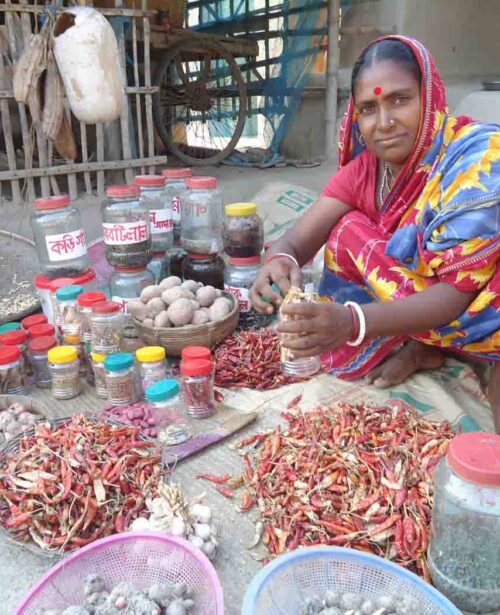“gachpala, mati, pani, pakhi, goru sob niyei amader grameen sangsar. Eikhane ekjoner kothe bhable hoina, sobar kotha bhabte hoi. Ei shiksha ami amar gram theke paichi. BARCIK theke ami atmabiswas paichi, amader goriberje nana sampad ache seita niya kibhabe bhalo bhave kaj kora jai seita bujhte parchi. Ami ekhon bhalo achi, amake dekhe gramer onek nari ekhon eibhabe bachte shikhche. Amar swami dinmajuri chere ekhon amar sathe krishikaj kore. Ami bujhte parchi manushke nijei nijer poribortoner daitto nite hoi, nijer shaktike abiskar korte hoi”.
(“plants, soil, water, bird, cow, we are all part of our rural family. It is not possible to live well without anyone of us. I learned this idea of pluralism and inclusion from my surroundings. BARCIK helped me to strengthen my confidence and facilitated to explore the resources in our so-called poor family. Now I’m happy with my family and everyday I’m trying to reach for my dreams. There are many poor women in my village motivated by my story and already started their sustainable integrated farm. My husband also got involved in my farming, leaving his previous day-labour work. Now I feel that all people have their own strength and can change their life if they take responsibility. I learned that I can do something for myself, for my family, for my community, for my village and also for my society. Once upon a time I was a poor, neglected woman but now I’m doing something for real social change”)
Alpona Rani Mistri, 45, a rural innovative farmer is living in the extreme saline zone in Bangladesh. Her village, Dhumghat, under lswaripur Union of Shyamnagar Upazilla of Satkhira District is among the areas most vulnerable to climate-induced disasters. She was born in a rural, poor farming family and married early.
It is very difficult to survive for a four-member family without any permanent income. When Alpona got married, her husband had already lost the land property he inherited. So, she started to cultivate her homestead garden while also working as a day-labourer in a share cropper’s rice field. Her husband also worked as a day-labourer that required him to occasionally migrate and leave his family.
In 2009, they lost their house and everything they owned to the devastating cyclone Aila, including their agricultural land. Saline water affected their 33-decimal homestead.
Determination and seeds
Undaunted by difficulties following Aila, Alpona cultivated vegetables anew in her homestead but there was scarcity of local seeds and organic inputs.
In 2012, she participated in a village agro-biodiversity fair facilitated by BARCIK. A farmer organisation assisted by BARCIK later contacted her and gave her some local seeds of different crops and shared organic farming processes. With these, she developed an integrated agricultural plan and started her journey in her 33-decimal homestead land.
Innovation and adaptation
Alpona Rani is proving her skill and confidence day by day. Not only in terms of production, she is also in the process of researching climate-adaptive crop varieties and resilient farming techniques. She has already started an experiment on bean diversity and uncultivated food conservation. She is now growing seasonal vegetables the organic way and raising livestock. She has planted rare trees, medicinal plants and fruit trees in her surroundings. She is producing vermi-compost and botanicals which she also sells to other farmers. To further contribute to addressing health issues in the community, Alpona is also practicing traditional healing and helping poor people gain access to free primary healthcare.
Recognition, Rejection
Alpona is now a recognised woman farmer. She was first recognised as an inspiring farmer in a public program organised by BARCIK.To date, she has received the National Agricultural Prize from the HonorablePrime Minister, a Crest from the agriculture department, and the National WomanAward aside from many other regional and national recognitions.
Alpona continues to enhance her capacities, participating in various trainings and activities spearheaded by BARCIK. Recognising her practice and valuable contribution, the agriculture department tapped her as a trainer in its organic farming training. She also persevered in organising rural women and formed a women changemakers group in her village. Such efforts at galvanising women inspired local government to accord her space in different decision-making processes.
Alpona now strongly rejects hybrid seeds and chemicals while actively promoting local seeds exchangeand organic farming techniques among women. With her help, rural families are challenging market-driven, chemical agriculture through the expansion of their organic farms.
The national media of Bangladeshconsiders her an icon of sustainable farming. Alongside all the praises, Alpona is just equally happy that her family warmly appreciates her community involvement. Her husband eventually left his day job and returned home to help her in their sustainable family farming.
________
Alpona is one of the success stories featured in “The Enduring Narratives of Agroecology” by IPAM & PANAP.


